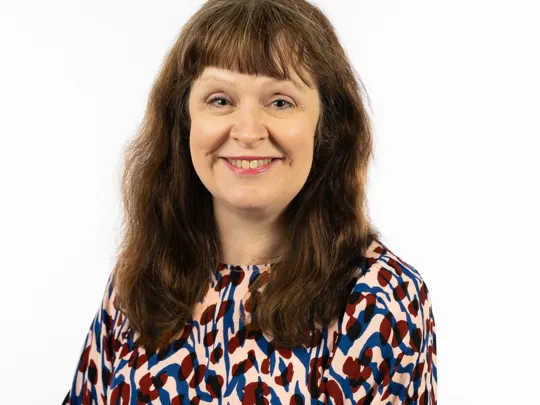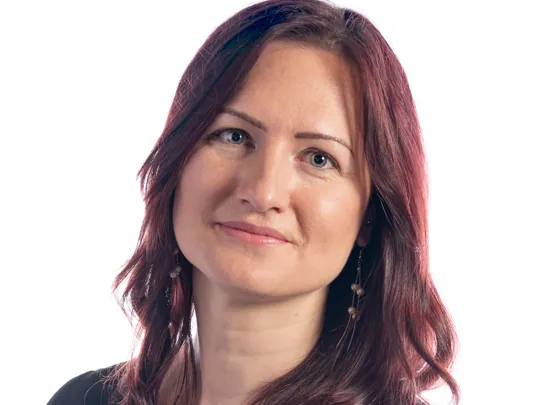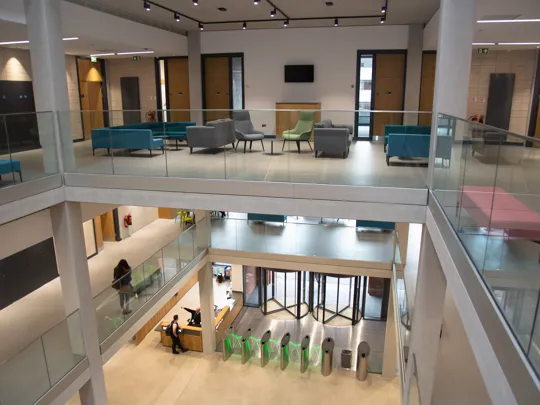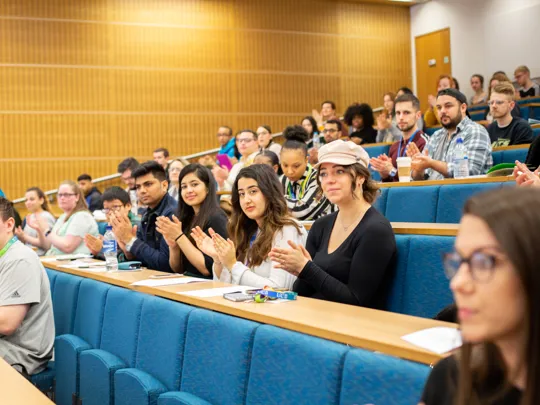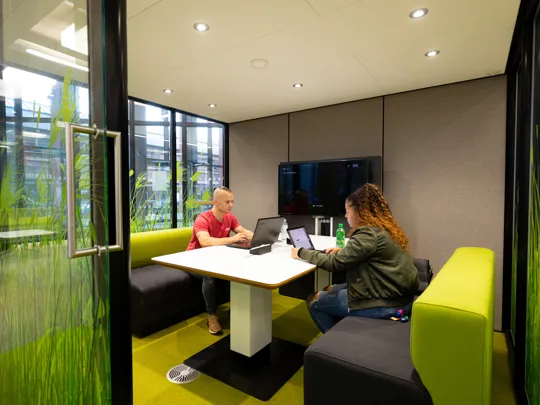of graduate employers say relevant experience is essential to getting a job with them
Why should I choose this course?
- ACCELERATED DEGREE – Start your future in just two years with our accelerated primary education degree, with the opportunity to progress onto teacher training or move directly into industry
- WORK PLACEMENTS – Test your training in the real world on multiple work placements in a variety of industry settings, from schools and charities to museums and theatres
- SPECIALISE YOUR STUDIES – We work with you to provide experience suited to your career aims, allowing you to explore roles and sectors within education
- NO EXAMS - If you are not keen on exams, this course is for you. Unlike many degrees in this field, you will have no written exams during or at the end of the course and will be assessed through practical assessments and coursework only
- AWARD-WINNING UNIVERSITY – Study at the highest-ranking university in the region according to student choice (Whatuni Student Choice Awards 2023)
Our facilities
Our learning spaces at University College Birmingham ensure you have the right environments to build your knowledge, from lecture theatres to interactive group working spaces and extensive library resources.
Course breakdown
This is a two-year accelerated degree course. Level 5 study takes place in the second semester of Year 1 and the first semester of Year 2.
- Year 1
- Year 2
Modules
Introduction to Education Studies
Education is a process, a subject and an academic discipline. This module aims to develop your awareness of all three and is designed to help you transition from previous experience and learning to undergraduate study. It provides you with essential skills to support you throughout your degree, including academic writing, presenting and collaborative working, as well as exploring all the elements that make education studies unique.
The Developing Learner 1: An Introduction to Neurological and Physical Development
Children are born ready to learn, however it is the quality of a child's experiences in the first few years of life that can have a lasting impact on their ability to be mentally and physically healthy. The basic architecture of the brain is constructed through an ongoing process that begins before birth and continues into adulthood. This module will therefore invite you to explore the factors, both internal to the child and environmental influences, that may contribute to supporting healthy brain and physical development. It acknowledges that the developing brain is open to influential experiences, both positive and negative, and will examine key issues, theories and debates related to the developing learner.
History of Education in the UK
This module explores education in the UK, from early examples of formal schooling to the present day, to provide a context for historical and contemporary ideologies. It encourages you to take an analytical approach and enables you to challenge and critique educational policy, values and related provision. You will explore key themes such as societal impact, equality, special educational needs, the role of the state, social justice and economic influences while developing your ability to access, organise and evaluate information to develop coherent academic discussion.
Exploring the Learning Environment
This work experience module is designed to help you identify the ways teaching and learning can be organised in a range of settings. It will offer you the chance to select contrasting opportunities to enable you to evaluate how environment impacts on the educational experience of all involved.
Early Learning and the Primary Curriculum
This module invites you to explore how policy influences pedagogy and the differences between a curriculum and a framework for learning. You will learn about the Early Years Foundation Stage (EYFS) and the National Curriculum for England in order to begin to identify your own views on appropriate pedagogies for the Primary age phase depending on subject and context. You will develop your planning skills and ability to reflect on practice as a developing professional.
Theories of Reflective Practice in Education
In this module, you will develop your understanding of the importance of reflection to inform professional practice in a primary education context. You will explore contemporary theories of reflection, examining how these can be applied in order to provide insight for teaching and learning. You will be encouraged to explore personal beliefs and the potential impact of these on your own professional practice, and on the practice of others, in order to equip you with reflection as a professional competence. Reflection fosters resilience by increasing self-awareness, improving problem-solving skills, and enhancing emotional regulation. Through reflection, individuals can re-frame challenges and build confidence in their ability to handle future difficulties, making it a key skill in your journey as an educator. You will work collaboratively, through discussion and applied tasks, to evaluate research related to reflective practice, in order to develop your understanding of how teaching and learning can be effectively tailored to meet learner requirements.
Ideology and Sociology in Primary Education
This module focuses on the purpose and impact of primary education on wider society. It examines underlying educational ideologies and agendas, as well as the organisation and delivery of primary education, in both historical and modern-day contexts. Exploration of theory associated with the sociology of education will support you to consider if and how the primary education system, and its associated practices, have challenged or created inequalities in society. You will also have opportunities to critically evaluate alternative educational approaches.
Modules
The Developing Learner 2: Understanding Cognition, Language and Behaviour
Learning is a complex and ongoing process based on how we make sense of our world using new information and experiences. This module builds on The Developing Learner 1 and explores the relationship between cognition, language and behaviour. You will examine key issues, theories and debates in relation to how children's patterns of thinking, language and behaviour are constantly changing in response to the interactions they have with others and their environment. You will be invited to consider the complexities associated with both the internal and external factors that may influence children's cognitive function, their language acquisition and behaviours.
Developing Professional Practice in Education
This module will help you identify what professional behaviours are expected in education settings. You will explore the frameworks used by teachers and childcare workers in the UK to judge professional standards and competences, and then use these during work-based placements to identify the attributes associated with educational provision.
Philosophy, Ethics and Values in Primary Education
The role of the educator has an important ethical dimension that should not be overlooked. Educators must uphold certain ethical standards within their practice to ensure that they act as a 'good' role model to their students and that they provide them with a 'good' education. But what constitutes a good role model or a good education? The moral education of children only becomes more ethically complex as the student population in the UK becomes increasingly more diverse, resulting in a more diverse set of identities and potentially conflicting values being encountered within the classroom. The modern digital world we live in adds further complexity to both the lives of children and those who must educate them to be able to manage this complexity successfully. Contemporary educators have to negotiate this ethical landscape and encounter challenging ethical dilemmas in carrying out their role. They must think and act with special care when making ethical judgements that concern the needs and interests of their pupils. In this module, you will explore some of the interesting and important ethical issues raised here and reflect on your own values and philosophical positions in consideration of how these influence educators' practice. Philosophy provides frameworks for understanding, interpreting, and responding to adversity, all of which are essential for developing resilience. Through this module you will develop insight into how to view challenges as opportunities for growth and develop insight in to managing difficult experiences that are frequently presented in practice situations.
Contemporary Issues and International Perspectives on Primary Education
Education is a global concern. This module aims to develop your awareness and understanding of key educational issues and debates from contemporary Britain and around the world. It will encourage you to select data sources, analyse current research and argue a personal position in relation to a self-selected topic, chosen from those studied during the module.
Inclusion, Diversity and Equality in Education Settings
This module explores how social and cultural experiences have implications for diverse learners’ education in mainstream and SEN settings. You will explore issues of equality and difference in relation to primary education both in the UK and globally, looking at relevant legislation and practice in order to justify your own position based on principles of equality of access, provision and outcomes.
Research in Education
Educational research helps us to understand the process of learning and teaching. In this module you will be introduced to the guidelines, skills and competences needed to explore a self-selected topic relevant to primary education. You will be supported by a dissertation tutor to plan and carry out a research project, including the development of an ethical approach, data collection methods and analytical skills.
The modules listed above for this course are regularly reviewed to ensure they are up to date and informed by industry as well as the latest teaching methods. On occasion, we may need to make unexpected changes to modules – if this occurs, we will contact all offer holders as soon as possible.
Entry requirements
Entry requirements
A-levels: Grade profile of 112 UCAS points from a minimum of 2 A-levels (e.g. A*A* or BBC) in any subject combination.
T-levels: A T-level with an overall Merit grade
BTEC: Grade profile of DMM from any subject. This can be achieved from either an Extended Diploma or a combination of smaller BTEC qualifications.
Tariff: Other Level 3 qualifications are accepted at University College Birmingham for entry. A minimum of 112 UCAS Tariff points will be required from a vocationally relevant subject matter.
GCSEs: GCSE/IGCSE maths, English language and science grades A*-C/9-4 (no equivalence).
Students on this course are subject to the Code of Professional Conduct and Fitness to Practise Policy, together with a Disclosure and Barring Service (DBS) check. University College Birmingham will co-ordinate and fund the completion of the DBS check.
International students
For academic and English entry requirements for EU and international students, please visit the Country Specific Information page.
Please note: As an International Student, when choosing optional placement, a visa extension may be required.
Key information
Teaching and assessment
Note: Indicative information only – actual timetables and assessment regimes will be issued at your induction.
Teaching
Example of a typical teaching week (up to 12 contact hours):
- Large group teaching – 6-7 hours
- Smaller group teaching – 2-3 hours
- Tutorials – up to 2 hours
As this is an accelerated course, it runs throughout the entire academic year, from the end of September to July/August. Some weeks are timetabled as intensive study, requiring an increase in contact hours. The above reflects the minimum and a maximum number of hours expected.
You will also need to commit around 25 hours per week for individual study time.
Assessment
Estimated breakdown of assessment for this degree course:
- Coursework/practical assessment – 100%
Our teaching and assessment is underpinned by our Teaching, Learning and Assessment Strategy 2021-2024.
Timetable
Whilst your lessons will be timetabled into 2-3 days a week, it is worth noting that your course includes regular placements in addition to these hours.
Tuition fees for home students
If you are a home student enrolling on this accelerated degree in 2025/26, your fee for the academic year will be £11,100.
Tuition fees for international students
If you are an international student (or have been fee assessed as an international fee payer) enrolling on this accelerated degree in 2025/2026, your fee for this academic year will be £18,500 per year.
Kick-Start Scheme
As a new student studying this course full-time, you will receive £300 per year through our Kick-Start Scheme (UK students only, eligibility criteria applies). This scheme will support your studies and future career by contributing to course-related materials, uniform or selected items on campus. You may also qualify for an additional £500 per year.
Find out more about the Kick-Start Scheme here.
Unibuddy Community - meet other students on your course
Starting university is an exciting time, but we understand that it can sometimes feel a little daunting. To support you, you will be invited to join our Unibuddy Community, where you can meet other students who have applied for the same course at University College Birmingham, before you start studying here.
As soon as you have been made an offer, you will be sent an invitation email to complete your registration and join the Unibuddy Community. For more information, check out our Unibuddy Community page.

Have questions around your chosen subject or course content? Are you wondering what you can expect to study as part of your course? Fill out our form and chat to a lecturer.
Work placements
Work placements are vital for gaining real-life experience and for building your confidence and skills before you finish your course – and they may even lead to a job when you graduate. Our Hired team can help find the ideal placement for you.
Our accelerated BA Primary Education Studies degree course features two placement modules (one per year), placing you within a range of settings in order to gain hands-on experience of the different areas where education professionals may work.

Aimed at future education professionals, practitioners and policy-makers, our innovative, accelerated two-year course is designed to provide students with a critical understanding of this phase of education – both in the UK and internationally – to help them evaluate how theory, policy, ideology and practice impact on young learners.
Career opportunities
Note: Some roles below may require further study/training. The roles and salaries below are intended as a guide only.
Community education officer
Average Salary: £28,000
Museum education officer
Average Salary: £24,000
Education administrator
Average Salary: £33,500
Education consultant
Average Salary: £34,171
Learning mentor
Average Salary: £22,500
Primary school teacher
Average Salary: £29,364

Alison’s Story
Alison worked for over a decade in primary school settings supporting the learning and teaching of children across the 3-11 age phase.
What our students on this course say...
95%
of students say they have had the chance to bring together information and ideas from different topics
95%
of students say this course has the right balance of directed and independent study
97%
of students at the University say staff are good at explaining things
*National Student Survey (NSS) 2023
Course statistics
BA (Hons)
Meet your lecturers


